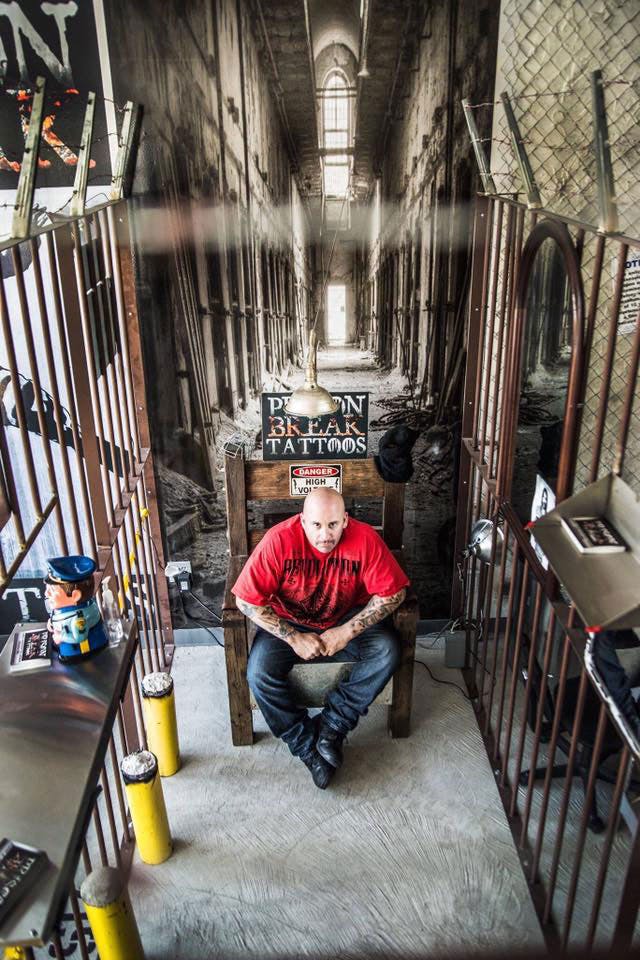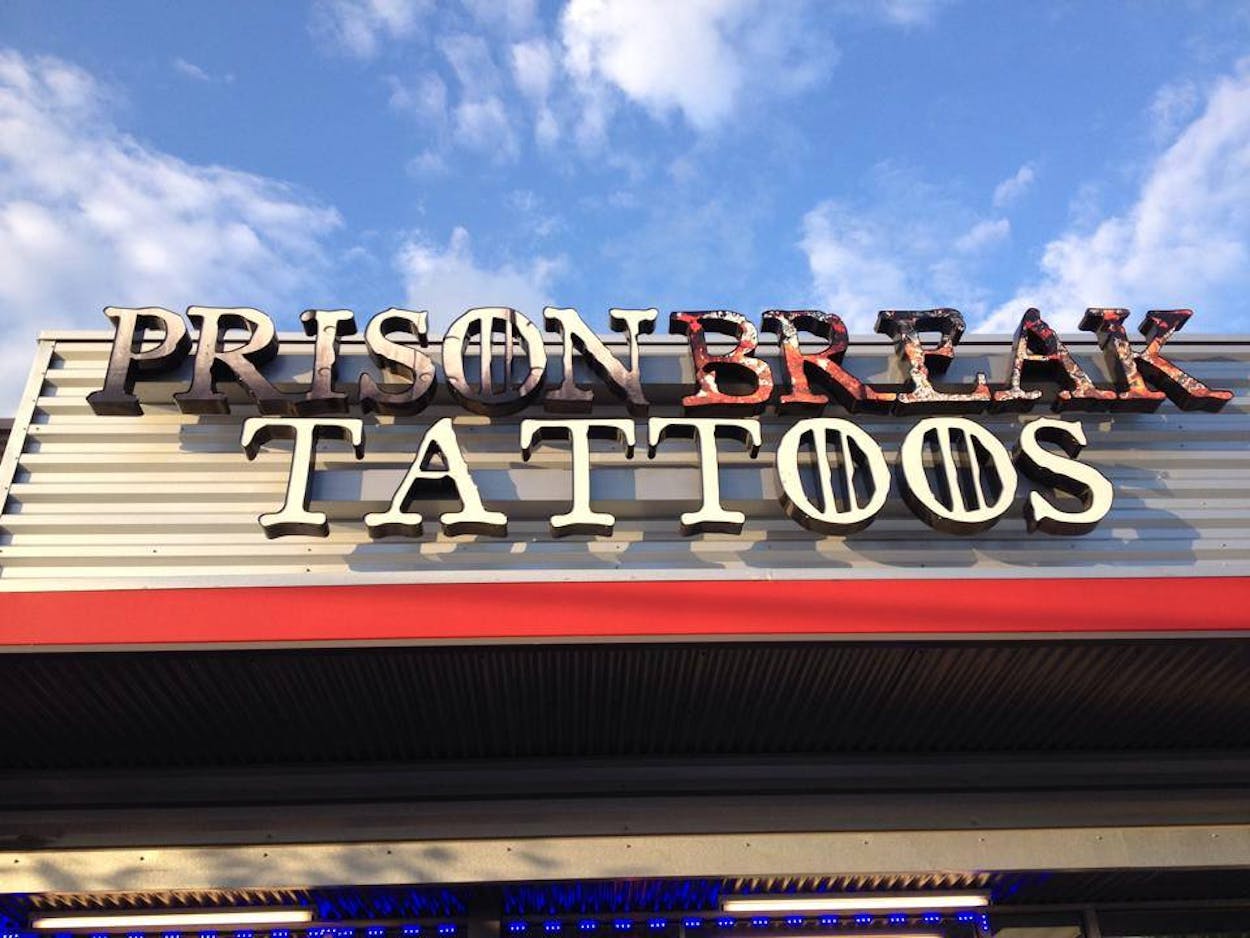To enter Prison Break Tattoos, a three-year-old tattoo parlor on Houston’s Washington Avenue, you must pass through an eight-foot-high barred metal gate topped with barbed wire, past a replica wooden electric chair (“Danger: High Voltage”), and a mannequin dressed in a SWAT uniform. Signs read “No Physical Contact At Any Time” and “By Entering You Agree To Be Audio & Video Recorded.” Inside are steel bunk beds, a prison payphone, and yards of crime-scene tape; hanging on the wall are a boxing glove signed by Mike Tyson and a black t-shirt that says “Keep Calm and Show Us Your Hands.”
This nonpareil establishment is the brainchild of Sergeant B.K. Klev, a 24-year veteran of the Houston Police Department. Klev founded it in 2013 as a place for him and his fellow law enforcement officers to get inked without worrying about whether the guy they arrested last week was wielding the tattoo gun. “The way the country is now, for me to walk into any unknown place and say, hey, I’d like a police-related tattoo—God knows what’s going to happen,” Klev explained. “It could be perfect, but on the other hand it might not. Maybe the artist likes the police, but the artist next to him doesn’t like them at all. Or the guy next to you could be getting a gang tattoo.”
Klev grew up in Houston and graduated from the High School for the Performing and Visual Arts—Beyoncé’s alma mater—before moving to San Marcos to study acting at what was then Southwest Texas State University. When it became apparent that an acting career was likely out of reach, he cast around for an alternative, eventually settling on law enforcement. “I think it might have been the first thing that I came up on as I was looking at majors,” Klev remembered. “I said, hey, criminal justice—that might be fun. Let me try that.”

After a few years with the Hays County Sheriff’s Office, Klev moved back to his hometown and took a job with the HPD, where he moved up the ranks and was eventually assigned to conduct undercover operations. About seven years ago, he decided that it might be helpful if he looked more like the criminals he was pretending to be, so he began visiting tattoo parlors around the city to get inked up. He loved the tattoos, but was less enthusiastic about the places he had to go to get them.
“As I’m sitting there and getting tattooed, I have this feeling that I can’t relax,” Klev said. “Number one, I don’t know who the artists are. There’s a guy in the back room high on something, talking to himself. The people in the booth next to me are yelling and screaming and arguing. And here I am, an officer, thinking, this is not comfortable for me. I want to be able to get a tattoo and not have to worry about putting my gun in my lap, or having to turn a certain way to see the front door, to see who might come in.”
As it happens, Klev discovered the perfect location for his new business while staking out bars on Washington Avenue a few years ago as part of the HPD’s vice squad. He was waiting to conduct a raid one Saturday night when he noticed a “For Lease” sign next to what seemed like an abandoned building. “I thought, Washington Avenue’s heating up, look at all these cars, look at all this traffic. I mean, you couldn’t drive down Washington on a Saturday night because it was just packed.”
Klev leased the building and set about transforming it into a miniature jail, complete with decommissioned prison equipment he got from a San Antonio junkyard. Not everyone understood the joke, as he learned by standing outside the shop and eavesdropping on passersby. “Some people were like, ‘Prison Break? We’re going to be tattooed by convicts?’ I would yell back, ‘It’s a theme!’”
Another difficulty was finding tattoo artists with clean records—HPD prohibits its officers from hiring felons—and the willingness to work for a cop. “That was a big issue for a lot of people. Some were like, I don’t want to work for a cop, because maybe I’m doing some stuff that I shouldn’t be doing.” Others told Klev they didn’t want to work somewhere that had the word prison in its name.
Klev eventually recruited enough tattoo artists to open up shop, some of whom even saw working at a police-run tattoo shop as a plus. “We don’t have to deal with a lot of the young kids who come in and want these dumb-ass tattoos,” said Chris Garcia, who has been working at Prison Break for about as long as it’s been open. He was in the process of inking a police badge onto the back of a policewoman who had flown in from Colorado for the occasion. (She’d heard about Prison Break on social media, where Klev maintains a lively presence.) Garcia has drawn tattoos for FBI agents, assistant district attorneys, and representatives from almost every branch of law enforcement.
As a full-time HPD officer, Klev has to cover up his tattoos during work hours, and make sure that his secondary employment doesn’t conflict with his official responsibilities. When Prison Break first opened, he kept it open until 4 a.m. on the weekends to take advantage of the party crowd, but soon realized the late hours were cutting into his sleep, as well as his sanity. “After six months, when we’re drawing a happy face on a guy’s ass and his buddy is throwing up in the bathroom, I’m thinking, this is not what I want to do.” He added, “I lost my patience with drunks a long time ago.” These days, the shop closes around 10 p.m. on weeknights and midnight on the weekends.
“The customers that I deal with typically don’t want to get tattooed at two or three in the morning,” Klev pointed out. “There’s nothing good that can come out of that.”








